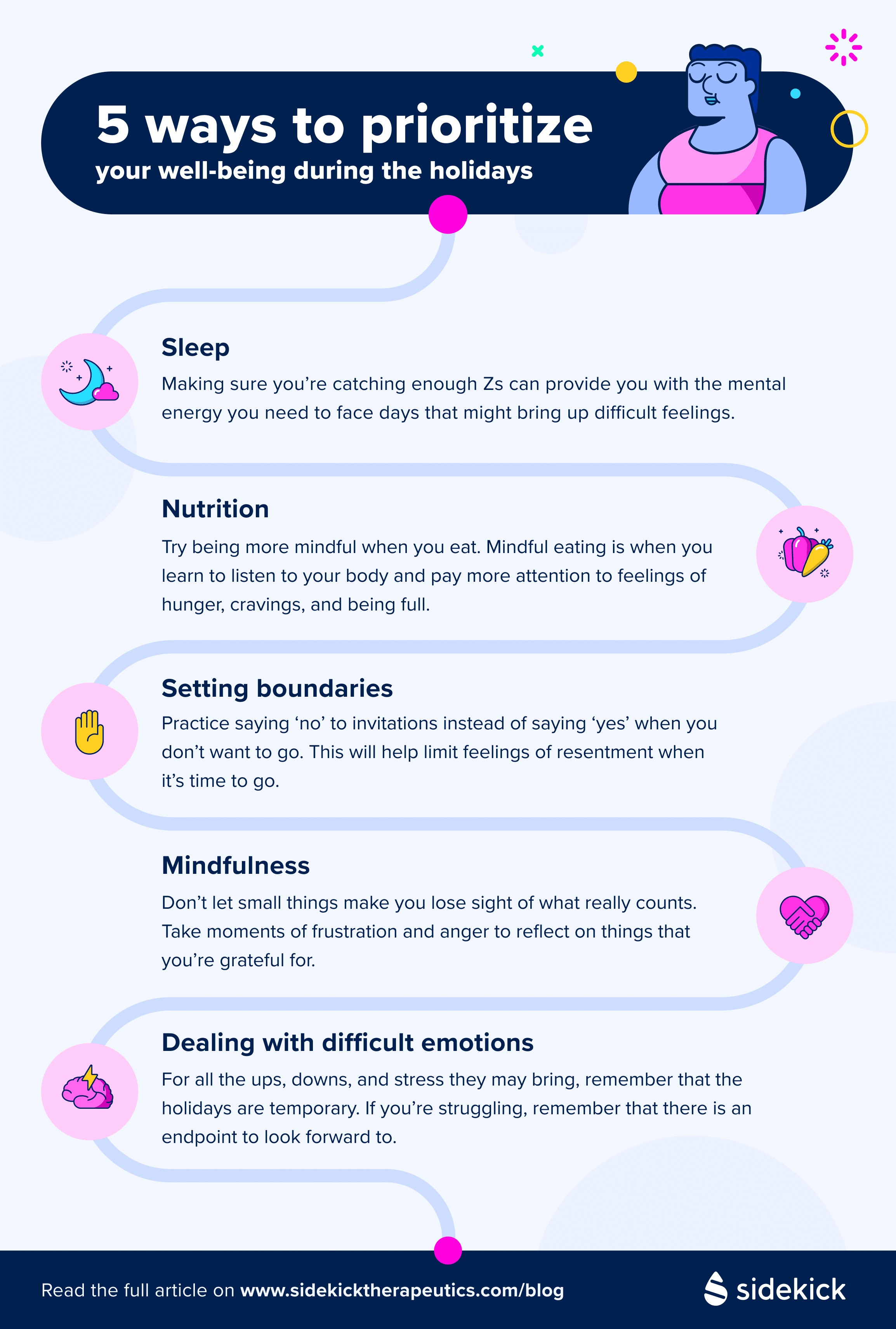|
Getting your Trinity Audio player ready...
|
While the holiday season can bring joy, festivities, and happiness, it can also bring stress, worry, and sadness. At this time of year, the pressure to “have a good time” can be overwhelming. In fact, according to a 2015 Healthline survey, 62% of people report finding the holidays either somewhat stressful or very stressful.
From worrying about having enough money to fretting over social events, the causes of holiday stress are plenty.
Others can include traveling, visiting family, or feeling pressured to entertain and buy loved ones the perfect gifts.
Some people may also be spending the holidays alone or may be dealing with the loss of family members or close friends, making this period especially hard as the holiday season may intensify feelings of grief or loneliness. And, along with other holiday stressors, these things can pile up and have a big impact on your overall wellbeing.
If any of these troubles sound familiar to you, we’re here to remind you that you’re not alone. There are ways that you can manage difficult feelings over the holidays.
We’ve put together some tips on how to prioritize your wellbeing so you can learn how to set your boundaries and live well during the holidays.

Sleep
A lack of sleep can affect your mental health, so making sure you’re catching enough Zs can provide you with the mental energy you need to face days that might bring up difficult feelings.
While children, shift work, and chronic conditions can make it hard to go to sleep and wake up at the same time every day, try to build a rough sleep schedule for yourself. This helps your body maintain its internal clock and stick to a routine.
This may be common for a lot of people, but using screens, especially scrolling through our smartphones in bed, can be a one-way ticket to sleep disturbance thanks to things like blue light and the addictive nature of social media and online gaming. Try to get into the habit of avoiding TV, scrolling on your phone or tablet, or working at your computer before bedtime.
If you’d like to learn more about how to practice healthy sleep hygiene, check out this article right here.
Nutrition
Holiday food can be hard to resist, especially if you’re feeling stressed. And while some indulgence may be manageable, it’s also important to be mindful of your eating habits during this time period, especially if you know what triggers a flare-up of a symptom you may experience if you are living with a chronic illness.
Instead of going without your favorite foods and treats, try being more mindful when you eat. Mindful eating is when you learn to listen to your body and pay more attention to feelings of hunger, cravings, and being full.
For example, eating more slowly and intentionally will help you to notice when you’re getting full. Often, we can eat too quickly and the signal we receive when we’re full comes after we’ve already overeaten. Being more mindful at mealtimes will allow you to really think about how much you’re eating and at what pace.
If you choose to drink alcohol during the holidays, be careful not to overdo it. For some, celebrations throughout this period may lead to binge drinking, which is classified as having five or more drinks for men and four or more drinks for women within two hours.
To prevent holiday binge drinking, try alternating alcoholic drinks with non-alcoholic beverages and making sure to eat before or while you’re drinking to delay alcohol from entering your bloodstream.
Another way to drink mindfully is to keep in mind the positive effects of staying hydrated when drinking alcohol. Along with the other benefits of drinking water, adequare hydration improves energy levels and brain function, maximizes physical performance, and may even treat headaches. Getting in the habit of drinking a glass of water in between alcoholic drinks can help to reduce the symptoms of dehydration you experience when you’ve had too much to drink.
Physical activity
Exercise might be the last thing on your mind with the busyness and stress that holidays bring, but if you can try and stay active during this time, your mental health may be better for it.
If you’re time-stretched, finding ten minutes here and there to do a quick workout could do the trick – you don’t even need to use any equipment! Try searching for quick bodyweight workouts on YouTube and squeeze one in whenever you have some free time.
Or, if you’re using a Sidekick program, you can search for workouts in the app. Explore our programs and find your Sidekick today.
If a sweaty workout doesn’t sound like your idea of holiday fun, a brisk walk outside will reduce stress and any snack cravings too! Taking a friend or family member along with you and having a chat while you walk might even take your mind off the fact that you’re exercising completely!
Stress reduction
Money, family, travel, social events, gifts, cooking – the holidays can bring up many difficult feelings, which may leave you feeling stressed. However, there are ways for you to manage it – here are a few tips to keep in mind:
- Practice saying ‘no’ to invitations instead of saying ‘yes’ when you don’t want to go. This will help limit feelings of resentment when it’s time to go. Learning how to set boundaries with the people in your life can enhance your mental health and help you avoid burnout. For example, if you’ve been invited to an event where there will be people you feel uncomfortable around, it’s totally fine for you to decline the invitation. This is a great example of setting your boundaries. Or, if you have friends or family members who tend to ask you intrusive questions about your personal life, practice telling them that you’re not comfortable discussing those topics and change the subject.
- Plan ahead by making shopping lists, thinking through menus, and diarising events with friends and family to help you stay on top of your time. Shops might be super-busy during the holidays, so consider doing your shopping online if possible.
- Take time for yourself in between the hustle and bustle, even if it’s just 15 minutes spent alone doing something you enjoy without any distractions.
Check out this article for more stress management tips.
Mindfulness and self-care
If the holidays make you feel stressed, especially if you’re living with a chronic condition or dealing with the loss of a loved one, it’s important to prioritize mindfulness and self-care. Here are some tips that could help you:
- Learn to accept imperfection and that things may not go as planned. If they don’t – that’s OK.
- Don’t let small things make you lose sight of what really counts. Take moments of frustration and anger to reflect on things that you’re grateful for, or on good things that have happened to you that day.
- If you have to spend time with difficult people, including friends and family members, always respond with kindness. If you experience tense moments with someone, take some deep breaths and try to take a new perspective: holidays can be difficult for some people and they may be suffering, so try not to take unpleasant moments personally.
- Meditation might be something that helps you de-stress and find calmness during the busy holiday period. Our Sidekick programs are full of meditation and mindfulness tips to help you look after your well-being. You can read more about them here.
- If you’re living with a chronic condition, tune into your body and listen to what it’s telling you. If your symptoms flare, this could be a sign that you’re overtired or stressed. Make sure to take time out of holiday preparations and events when you need to.
- Being a caregiver can be stressful due to having the responsibility of looking after someone who’s living with a chronic condition. But just like anyone, caregivers also need time to themselves to practice self-care. If this means communicating to family members that you need support, or booking in a homecare worker while you take some time off, make sure to plan this ahead of the holidays so that everyone is aware of their schedules.
Dealing with loneliness
Don’t make managing stress a solo job during the holidays. If you’re feeling overwhelmed, reach out to family or friends and take some time to chat about the concerns you’re having.
If you live alone or your family doesn’t live close by, there are many online support groups that can offer you companionship. Find social events in your area with like-minded people, and try being open to meeting new friends.
Volunteering is another way of socializing with new faces while also giving something back to those in need during the holiday season.
If your stress or negative feelings persist and you feel like this is affecting your daily life, you may find it helpful to talk to your doctor or a mental health professional.
Finally, for all the ups, downs, and stress they may bring, remember that the holidays are temporary. If you’re struggling, remember that there is an endpoint to look forward to. It might even help you to make some plans for when the holidays are over to have something to be excited about.
For more information about dealing with other sources of stress, as well as other healthcare topics, check out our library of articles here.




